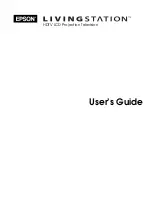
Connections and Setup
Protect Against Power Surges
Connect all devices before you plug any of their power cords into the wall outlet or power
strip. NEVER plug your TV into an outlet that is controlled by a wall switch.
Turn off the TV and/or device(s) before you connect or disconnect any cables.
Make sure all antennas and cables are properly grounded. Refer to the Important Safety
Instructions at the beginning of the User's Guide
Protect Devices from Overheating.
Don't block ventilation holes on any of the devices. Arrange the devices so that air can
circulate freely.
Don't stack devices.
If you place devices in a stand, make sure you allow adequate ventilation.
If you connect an audio receiver or amplifier, place it on the top shelf so the heated air
from it won't flow around other devices.
Position Cables Properly to Avoid Audio Interference
Insert each cable firmly into the designated jack.
If you place devices above the TV, route all cables down the side of the back of the TV
instead of straight down the middle.
If your antenna uses 300-ohm twin lead cables, do not coil the cables. Also, keep the
twin lead cables away from audio/video cables.
Use Indirect Light
Don't place the TV where sunlight or room lighting will be directed toward the screen.
Use soft or indirect lighting.
Things to Consider Before You Connect
Connections and Setup
Get the Picture
The first part of connecting your TV is to get the picture, also known as the signal. The back
panel of your TV allows you to receive analog and/or digital channels by using the
ANTENNA/CABLE INPUT. See the graphic to the bottom for location of the jack.
-6-
Summary of Contents for SLTV-2632A-2
Page 36: ... 35 ...
Page 37: ... 36 8R28 ...








































